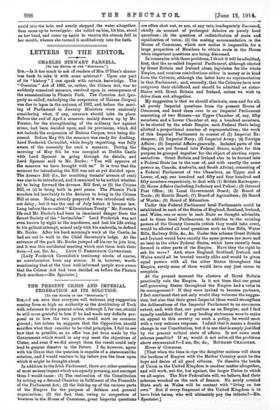LETTERS TO THE EDITOR.
CHARLES STE WART PARNELL.
[To wiz Enna. op lux “SpEcraros."1
Sea—Is it too much to ask of readers of Mrs. O'Shea's shame- less book to take it with some mistrust ? 'Upon one part of its " history " I can speak with certain knowledge. The "Coercion" Act of 1 2, or, rather, the Crimes Act, was no suddenly conceived measure, resolved upon in consequence of the assassinations in Phcenix Park. The Coercion Act (pro- perly so called, embodying the suspension of Habeas Corpus) was due to lapse in the autumn of 1882, and before the meet- ing of Parliament in January Ministers were anxiously considering what, if any, measure should take its place. Before the end of April a measure, mainly drawn up by Mr. Forster, for the strengthening of the ordinary law against crime, had, been decided upon, and its provisions, which did not include the suspension of Habeas Corpus, were being dis- cussed. Before May 6th the measure was ready for drafting. Lord Frederick Cavendish, while deeply regretting, was fully aware of the necessity for such a measure. During the morning of May 6th he was occupied at Dublin Castle with Lord Spencer in going through its details, and Lord Spencer said to Mr. Burke : "You will approve of the measure we have brought with us." It is true that the moment for introducing the Bill was not as yet decided upon The Arrears Bill (i.e., for remitting tenants' arrears of rent) was also to be introduced, and it remained to be settled whether (a) to bring forward the Arrears Bill first, or (b) the Crimes Bill, or (c) to bring both in pan i passe. The Phcenix Park murders led inevitably to the decision to bring in the Crimes Bill at once. Being already prepared, it was introduced with- out delay ; but it was the end of July before it became law. Long before the so-called "Kilmainham Treaty" Mr. Forster's life and Mr. Burke's had been in imminent danger from the Secret Society of the "Invincibles." Lord Frederick was not even known by sight to the murderers, and lost his life owing to his gallant attempt, armed only with his umbrella, to defend Mr. Burke. After his hard morning's work at the Castle, he had act out to walk to the Chief Secretary's lodge. At the entrance of the park Mr. Burke jumped off his car to join him, and it was this accidental meeting which cost them both their
lives.—I am, Sir, &C., LUCE 0. FREDERICK CAVENDISH.
[Lady Frederick Cavendish's testimony needs, of course, no corroboration from any source. It is, however, worth mentioning that at the time well-informed people were aware that the Crimes Act had been decided on before the Phcenix Park murders.—ED. Spectator.]










































 Previous page
Previous page